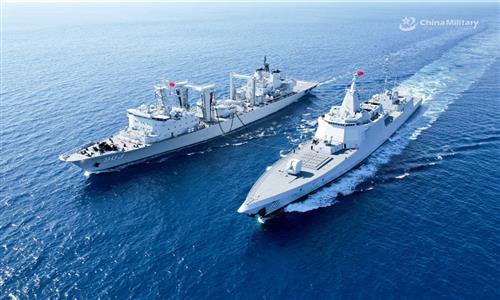China’s defense budget reasonable; ‘military threat' claims reflect Western anxiety

Graphic:Global Times
Whenever China announces its defense budget, some foreign media outlets are quick to peddle speculative commentary, regardless of how moderate and reasonable the increase actually is.On Wednesday, China announced a 7.2-percent increase in its 2025 national defense budget. This year, the planned defense expenditure of the country will be 1.784665 trillion yuan (about $249 billion), according to a draft budget report issued at the opening of the third session of the 14th National People's Congress (NPC). Media outlets, such as the Associated Press, have interpreted this as an attempt to "challenge the US defense lead in Asia," while Reuters highlighted China's "intensive military exercises."
Such portrayals of China's defense spending and routine military training aim to depict China as a "threat" to regional security. "The fabrication of the so-called China military threat reflects the West's tendency to view China as an adversary and competitor, mirroring its confrontational mind-set and strategic anxiety," Chinese military expert Song Zhongping told the Global Times.
China pursues a road of peaceful development, upholding a national defense policy that is defensive in nature, with its military spending mainly focusing on protecting its sovereignty, security and development interests. China's military spending growth poses no threat to any nation; the country does not engage in arms races, nor does it seek to challenge any country's "leading" position.
The defensive nature of China's national defense policy is first reflected in its commitment to not seeking global hegemony or delineating spheres of influence. The US has about 750 military bases worldwide, while China has only one overseas support base in Djibouti, primarily used to support escort missions in the Gulf of Aden. Additionally, China's military strategy emphasizes "active defense." Since the founding of the People's Republic of China, the country has never initiated a war or invaded any country but has remained committed to resolving international disputes through dialogue and cooperation.
China's defense expenditure has remained moderate and reasonable. For 10 years in a row, China's annual defense spending has maintained single-digit growth, with growth rates for 2024 and 2023 also set at 7.2 percent.
"Without a strong national defense, the achievements of economic development cannot be guaranteed, nor can the people live happily and peacefully," another Chinese military expert Zhang Junshe told the Global Times. As the economy develops, China's defense spending should also increase steadily to ensure that defense capabilities align with economic growth, Zhang noted. As Luo Qinjian, spokesperson for the third session of the 14th NPC, stated during a press conference on Tuesday, "Peace needs to be safeguarded with strength."
China's defense expenditure as a percentage of GDP, which has been kept under 1.5 percent for many years, is lower than the global average. China's figure is much lower than that of the US, which has pledged to spend no less than 3 percent of its GDP on national defense. In per-capita terms, China's defense spending has been far less than that of Washington, too. Notably, in recent years, the US government has continually pressured its allies to increase defense spending. For instance, the US pushed all NATO members to increase their defense spending to 5 percent of their GDP.
"In contrast, China's defense budget growth is reasonable and moderate, avoiding an arms race. It is primarily aimed at enhancing defense capabilities to cope with a complex international security environment and to shoulder more international responsibilities," said Zhang.
China's military development is rational, legitimate, and necessary. However, some countries persist in portraying China's military exercises and training activities as a "threat." In February, when the Chinese navy conducted live-fire drills in the Pacific, certain Australian media outlets sensationalized the event. China's activities on the high seas were in accordance with international law and established practices and are not directed at any country or region, yet they seem to trigger sensitivities in some nations.
"Distant sea training is a necessary step to enhance the Navy's capabilities in far-sea operations, thereby better safeguarding national sovereignty and security," said Zhang. Additionally, it enables the Navy to fulfill international responsibilities and obligations more effectively, providing more public safety services to the international community.
China pursues a road of peaceful development, keeping its defense budget within a reasonable range. Enhancing military capabilities is not only to defend China's own interests but also to contribute to regional and global security and stability. In the face of unfounded speculation from external sources, China will continue to strengthen its defense construction while maintaining openness and transparency, using concrete actions to counter the baseless accusations of the "China military threat" rhetoric.


